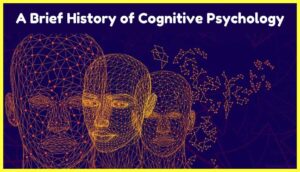A Brief History of Cognitive Psychology
This Article lecture traces the roots of Psychology in Philosophy and Physiology. A Brief History of Cognitive Psychology Theory, Example, Images, pdf and covers the philosophical antecedents of Psychology from early and modern thinkers who have substantially contributed to the investigations of the human mind, which is primarily about the connection between the body and mind. This lecture also briefs on the positions of various schools of Psychology.
In today’s lecture, I will take you through the development of the ideas of cognitive psychology. I will talk about how the ideas related to mind and behaviour originated in the ancient Greek schools of philosophy. We will also see how later philosophers contributed to the growth of this idea and then we will go to various schools of thought that emerged in psychology from their will go to the place where the ideas about cognition and cognitive psychology, the ideas about mental processes take shape and that basically leads to the kind and contemporary form of enquiry that is cognitive psychology.
Now, why is doing all of this necessary? Why do I want to actually do this in today’s lecture? There are two simple reasons, one of them is that by going through this historical chart of how these ideas developed what we will be doing this, we will be seeing how a particular idea which seems rather commonsensical has been approached through a variety of perspectives from ancient times to the more recent times. We have to talk about also how various people contributed to the growth and development of this idea. They have been contributors to a variety of disciplines in this discipline of cognitive psychology, and in this lecture today I would ask you to make those connections.
So it will be very important that you pay attention to how this particular idea of cognitive psychology actually develops from philosophy onwards, and with the inputs from even feels like artificial intelligence of computer science takes the form of enquiry which is known currently as cognitive psychology.
What is psychology?
Let us go to the routes of this word called psychology. The word psychology basically derives from the combination of two Latin words. The first word basically is psyche or soul. The second word is logia which is the study of, psychology basically defined means the study of the soul.
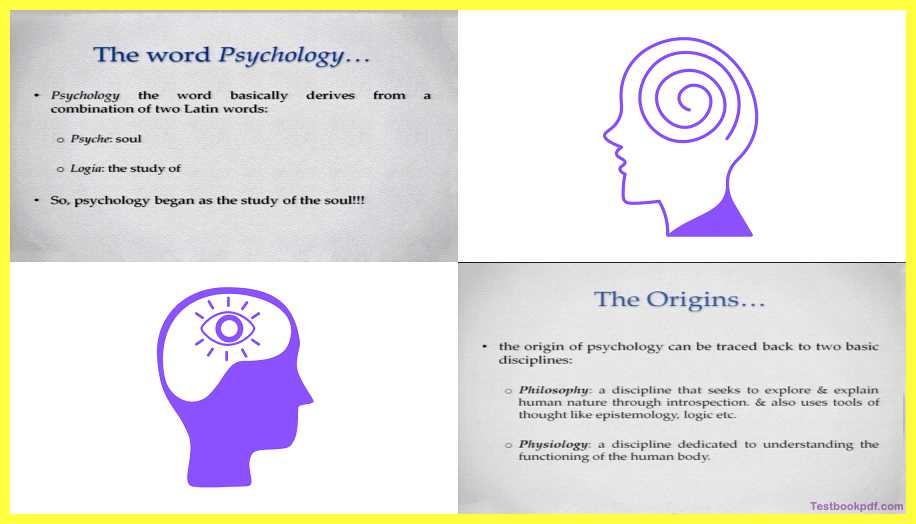
Meaning of Soul in Psychology
Now I would like you to take a moment and wonder what soul would mean here. Basically, by referring to the soul, those Asian Green philosophers were basically talking about what we probably today refer to as the mind. Anything that a person does we actually look for causes, we actually look for reasons, why and how the person is being able to do that or accomplish that particular behaviour. All of that in ancient times was basically attitude to this thing called the soul. So that is why it is logical to expect people to start talking about the soul as the seat of human behaviour.
We will see how that actually pans out in ancient philosophy. So origins of psychology then basically can be actually traced down to these two more basic disciplines which are –
- Philosophy
- Physiology
Philosophy
Now philosophy as you know is a discipline that seeks to explore and explain human nature through introspection. It also uses the tools of thought like epistemology, logic etc.
Now the subject matter of philosophy if you see is basically “thought”. So philosophy is concerned with how human behaviour, or how this world can be explained by analysing and reanalysing what we think. And philosophy also uses tools to actually analyse this process of thought. Say, for example, tools like logic.
Physiology
Physiology on the other hand focuses on the body. It is a discipline that is dedicated to understanding the functioning of the human body, it’s biological aspects of it how a particular organ is constituted how it functions and those questions.
So psychology, you will see basically focuses on the interaction of the mind and body. That is why psychology takes into account approaches both from philosophy and physiology. So this is basically what the roots of psychology are.
Ancient Experiments in Psychology
Now surprisingly, if you go back in time one of the first reported experiments in psychology can actually be traced back down to Egyptian times. There is no belief that similar experiments were not being done in the different other civilizations. But Here is this experiment.
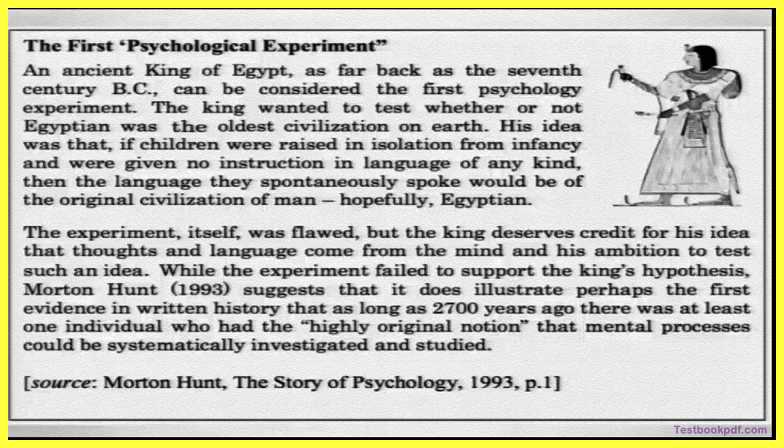
An ancient king of Egypt, as far back as the seventh century B.C actually wanted to conduct the first experiment. He had this idea that if children will race in isolation from infancy and were given no instruction in the language of any kind. The language that they actually end up speaking will be the original language of man or the language of the original human civilizations. So you wanted to test this out. So he actually raises a child in isolation and does that and basically finds out that the child ends up not speaking anything. So this hypothesis is actually not confirmed. But even though, this experiment fails to support the king’s hypothesis observes that it does illustrate perhaps the first evidence in return history that as long as around 27 hundred years ago there was at least one individual with this highly original notion that mental processes could be systematically investigated first. And the mental processes could be in studied and we have something to do with the body.
An Interesting Piece Of Anecdotal Evidence
So this is a very interesting piece of anecdotal evidence that actually tells us that people have been intrigued with this subject matter of human behaviour of the human mind and that is something which is basically been around with us for a long, long time.
Philosophical Antecedent of the Psychology
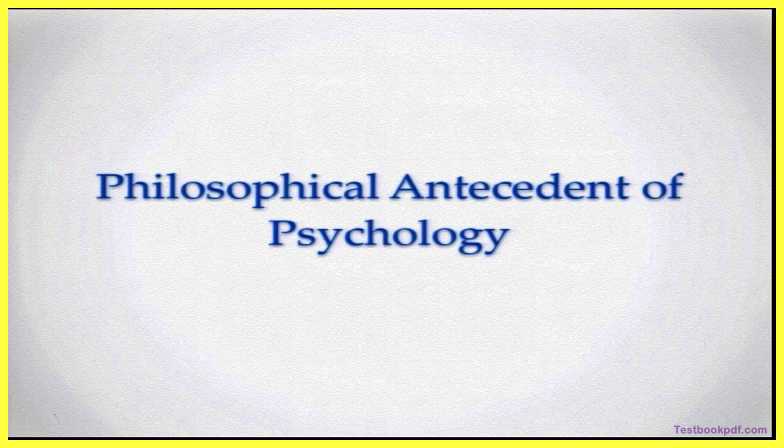
Now let us visit the philosophical Antecedent of psychology the basic thought processes in psychology that actually gave rise to the questions.
one of the first things in earlier days when somebody was trying to explain a mental illness of thought was that person aches who is basically experiencing mental illness of kind why he is basically affected by some demon some ghost or some spirits. Now those kinds of explanations were very popular which led to things like which hunting and people being prosecuted and those kinds of things.
Hypocrites as far back as 463 BC basically one of the first to Propose that mental illness was not caused by demons, but by genuine physical conditions. So you see hypocrites are basically where the first who was making this connection between the mind and the body. Hypocrites actually worked by dissecting human corpses and living organisms and through his experiments in these kinds of physiology concluded that it is the mind that controls the body. Further, he proposes that the mind basically resides in the head or in the brain. Now, this is one of the first times that actual behaviour is linked to something with the body.
Plato: The Early Thinkers…
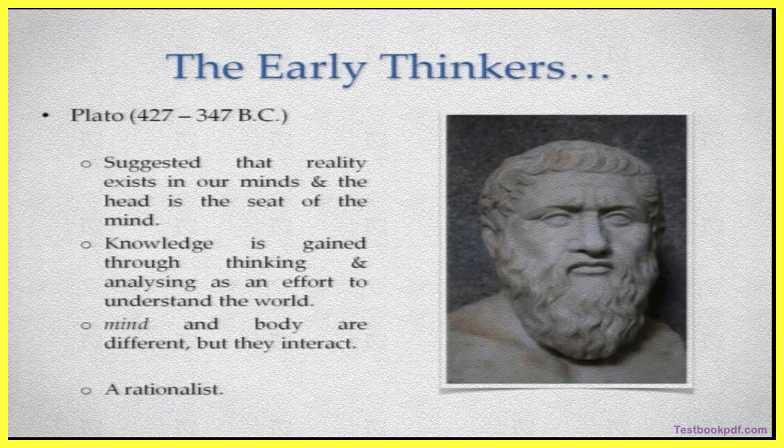
Another person and philosopher Plato, who is basically also one of the most influential Philosophers of all time suggest that reality basically exists in our minds completely and that head is the seat of the mind much like hypocrites as observed recently.
Now Plato is basically suggesting that knowledge is gained through thinking and analysis of thought and this is what basically is our effort to understand this world or the happenings of this world. So Plato basically suggests that minds and bodies are different things, but they might interact in some way or the other. Due to his emphasis on this whole process of thinking and thought as the source of knowledge, Plato has been turned into a rationalist.
Moving ahead, Aristotle who is basically a disciple of Plato actually felt quite the opposite. Aristotle felt that mind and body were one in the same concrete as what his teacher Plato talked about. Aristotle actually says that we can understand the mind by studying the body. So he is saying that the mind and body are basically the same things, and if you study the body you might eventually end up studying the mind as well.
He says that relying on concrete objects and actions rather than thoughts should be our scope of the enquiry or should be our scope study.
He says that reality lies in the concrete world. His methods are basically built upon observations of concrete fax numbers and those kinds of things and that is why Aristotle was regarded as an empiricist.
Bunch of Thinkers
Now let us move to a more modern bunch of thinkers and philosophers, not from the Greek era, but from somewhere close to us in time.
Rene Descartes
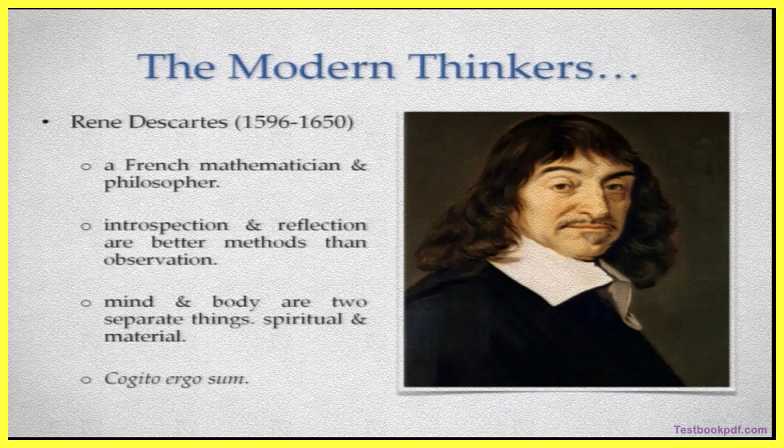
One of the most invention philosophers who basically really shaped the subject matter of psychology was Rene Descartes. Rene Descartes basically was a French philosopher and mathematician. He said that introspection and reflection are better methods than observation nodes. Now Descartes you might want to know basically believed that are observations a result of the working of our senses. And he believes that sense can actually make mistakes. He talked about particular kinds of illusions where in your senses will end up making say.
for example, if staring at a point of light for a few minutes and after that, you will experience the sensation of darkness even though there is no darkness outside. So Descartes basically believes that because our senses can be fooled or our senses can actually make mistakes we should actually have reliable observation rather than the information coming to us from our senses.
Are mind and body two separate things?
Descartes said that mind and body are two separate things, though he said that these two things interact through a seat in the head in a pineal gland. Descartes relates so much importance to thought and analysis and that importance can actually be seen reflected in this statement that he makes which is cogito ergo sum which basically translates to
- I think
- Therefore
- I am.
So, for Descartes, the source of the reality of this world basically lies in your thought and in your analysis of the world. Using This you can understand the happenings of the world.
John Locke (1632-1704)
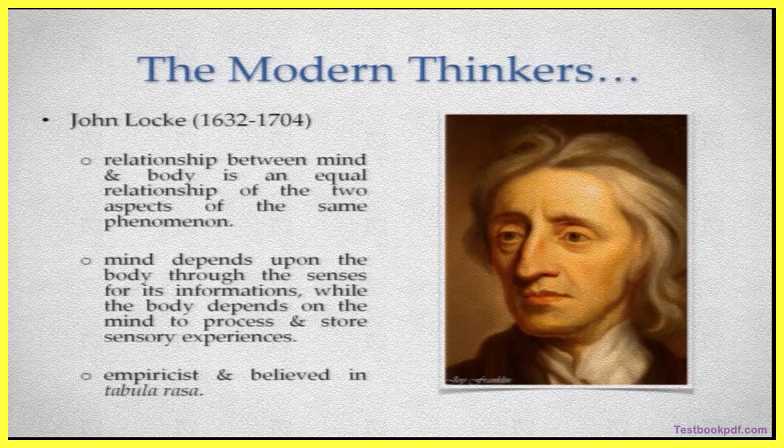
John Locke came after Descartes, he basically said that the relationship between the mind and the body is sort of an equal relationship wherein these two things are the forms of one in the same thing.
Locke basically says that the mind depends upon the body through its senses and the body depends upon the mind to process and store the information that is gained through the senses.
So Locke actually is giving something revolutionary because he is actually going on and saying that mind and body are one in the same thing and there is a definite way through is this interaction is taking place.
John Locke’s Tabula rasa: all human beings are born as blank slates in this world
Locke was also impoverished and he believed in the thought of tabula rasa. Tabula rasa basically means that all human beings are born as blank slates in this world. Everything that they learnt, everything that they finally achieve or accomplish any kind of behaviour is learnt by their interaction with this world.
Immanuel Kant (1724-1804)
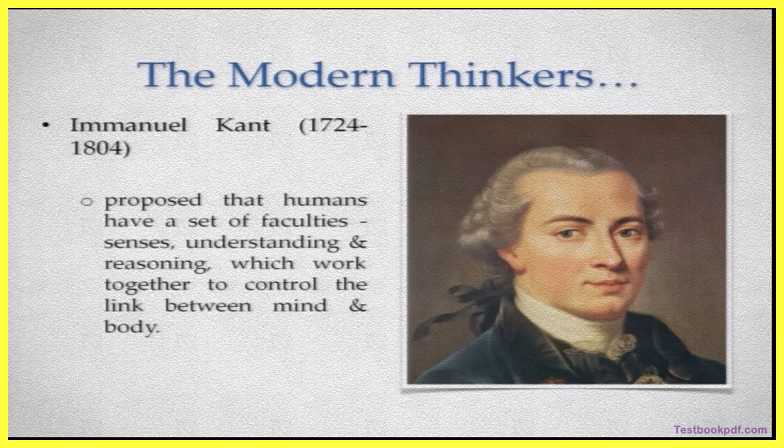
Another important philosopher was Immanuel Kant. Immanuel Kant. Basically says humans have a set of faculties.
He said that these faculties are your senses the faculties of understanding, and faculties of reason. These are the tools which basically work together to control this link between the mind and body. So by now, it is clear that mind and body are two things that may be the same, maybe separate, but there is an interaction certainly going on between them. And different people now are proposing different ways in which this interaction is taking place. So Immanuel Kant basically says that these faculties are the mental functions through which there is the interaction between mind and body that is going on.
Pause, Revise and Move Again
Now let us a brief pause, let us look back and let us see where we have from ancient Greece to more contemporary philosophers or not only contemporary to modern philosophers. So early thinkers, these early thinkers which we talked about have basically laid out the broad subject matter of what psychology is? And the subject matter is nothing other than the relationship between the mind and the body. We will elaborate upon this issue in more detail when we actually talking about the foundational assumption in cognitive psychology, but by this point you should be clear that this is something which is most important to ask questions to cognitive psychologies, even now people are constantly investigating what is mind, how does it relate to the body.
Mind in the earlier days could be studied in various ways, observable behaviour was to be one of the more important ways. Also, the body on the other hand could be studied by the biological or neural substrates.
So if you want to study the connection between the mind and the body and say for example – you want to investigate the body which is basically the brain, you have feels like neuroscience which will actually tell you about how the brain is constructed or how the brain really affects your behaviour. Mind on the other hand is this body of mental functions which we will see how they evolve and how they are actually structured.
Psychology thought system
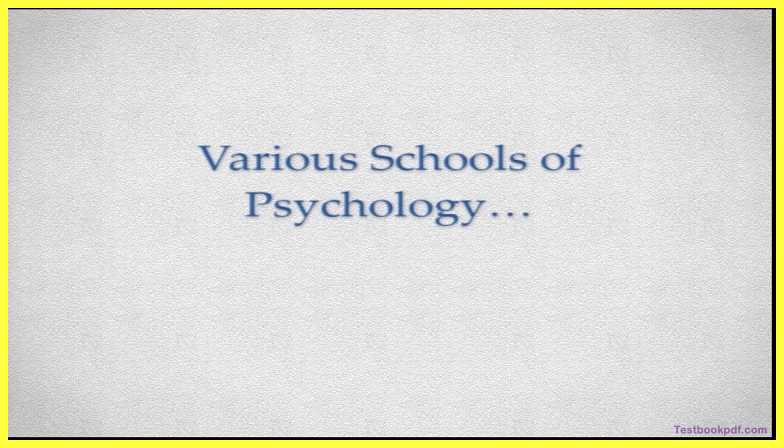
Now, this entire preface of philosophy actually led to the development of various kinds of thought or various kinds of thought systems in psychology. These thought systems have been organized as vary as schools of thought each school of thought has one or more prominent thinkers and it is these thinkers whose opinion forms the basis of this entire school of thought. So we will see we will examine how these different schools of thought contributed to the growth and to evolution of something that is cognitive psychology.
Wilhelm Wundt: schools of thought
One of the first and the foremost schools of thought in psychology was structuralism. Structuralism was founded by Wilhelm Wundt who is basically a psychologist in Germany and also established the first psychology lab in Leipzig, Germany. Wilhelm Wundt basically focussed on the nature of consciousness. He actually wanted to explain what consciousness is, he actually wanted to explain the components which form human experience. Wilhelm Wundt believed that it was possible to analyse the basic elements of the mind and conscious experience. If you talk to Wilhelm Wundt he might be able to tell you that the feeling of happiness is composed of X, Y and Z smaller components, or the experience of actually being in a particular place at a particular time can actually be boiled down to these smaller components.
Wilhelm Wundt: Structuralism
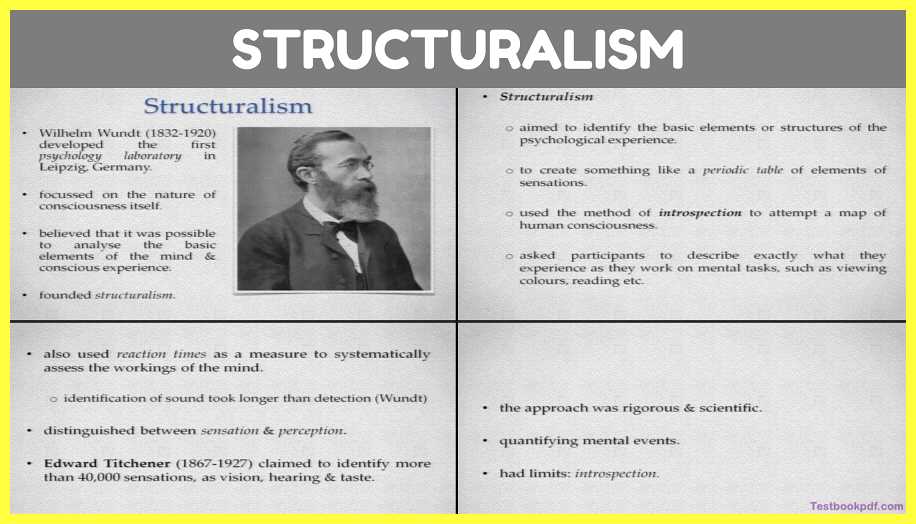
On the basis of this mainstream of thought, Wilhelm Wundt found this a school which is basically known as structuralism. Now structuralism basically aimed to identify the basic elements or of the cognitive psychological experience. They wanted to create something similar to the periodic table which basically had all of these elements of consciousness.
Structuralism used the method of introspection to attempt this map. Basically in a typical Wundt’s lab if you are a participant there the psychologist might just ask you to relax to sit down, and report as truthfully as possible in a detailed manner as possible whatever your experience at any point in time. Or for example whatever you are experiencing while you are engaged in a particular task. Say for example you have given a flower to a see, and you are actually experiencing this flower you might want to record that you are actually seeing a shape you are seeing a particular colour, you are smelling a particular order and you actually feeling texture when you touching or holding that flower. This is the detail, this is the componential structure of experience that the structuralism was actually emphasizing.
Sets of Experiences
Further structuralisms were actually using things like reaction times as a measure to systematically assist the workings of the mind. So what they would do is they would actually try and log while you’re experiencing certain steps and with that, they will use how much time a particular step took and they could actually try and did use then that what are the basic components of any experience and how much time it took everyone to go through those sets of experiences.
for example, if I actually play a sound in your headphones or if I play a sound here on this web page and if I ask you to identify that sound one of the first things that you will be able to register is that there is a sound being a plate. So the first thing that you will do is actually detection of the fact there is a sound. This basically refers to what sensation is.
The second thing that you might go on to experience is that you might be able to actually recognize the sound or the song let us say which I am playing. This recognition of that song is basically identification that is what perception is when the knowledge is in the scope of your awareness.
Identification took longer than Detection.
So Wundt and the structuralism basically found that identification took longer than detection. You might logically try and connect that first you detect it takes a bit less time, and then you try and identify what the song is, it takes a bit more after you have really deducted at there is a sound at least. So this is how Wundt’s school of a psychologist distinguish between sensation and perception. They’re actually following other scientific methods.
Edward B. Titchener one of the disciples of Wilhelm Wundt basically claims to identify more than 40,000 sensations such as vision, hearing, taste and so many others. This method or this approach followed by structuralism was another regress and very, very scientific. They were actually trying to quantify mental events. They were actually trying to quantify the human experience. But they had a bit of a problem because the main method they were actually using was that of introspection.
Ask Yourself What is Wrong
Now you may take a Pause and ask yourself what is wrong with introspection. And might now tell you that introspection basically one of the things that are wrong with introspection is that knowledge gained through introspection is not verifiable. Science is about verifying and proving to others that something exists, in that sense introspection was probably known as the best of the methods to follow that is one of the shortcomings, this structuralism schools of psychologists were having.
Functionalism
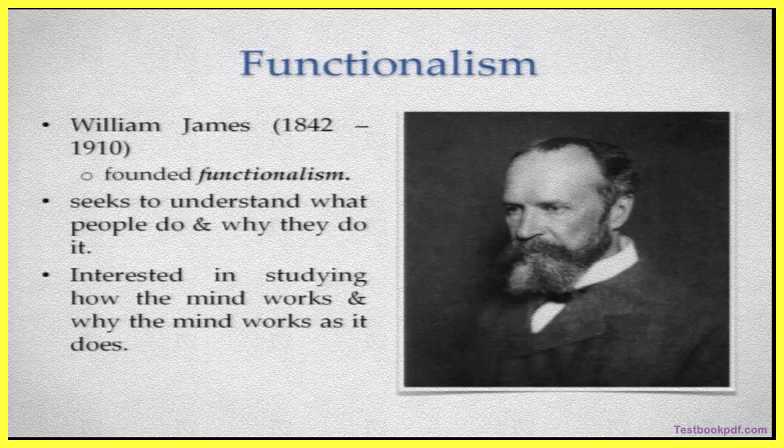
Let us move to the next school Functionalism. Many few would have heard that William James is sometimes referred to as the father of psychology. William James basically belongs to this school of thought which is turned into functionalism. Now functionalism is characteristic in a way that functionalist seeks to not only understand what people do which structuralism was also trying to do. But the functionalist would also concern with why people do certain things. Why do certain behaviours take place?
So they are interested in studying how the mind works, yes but also why the mind works as it does. So the questions this structuralist and the functionalist were asking were slightly different and let us say a bit more advance than the questions earlier asked.
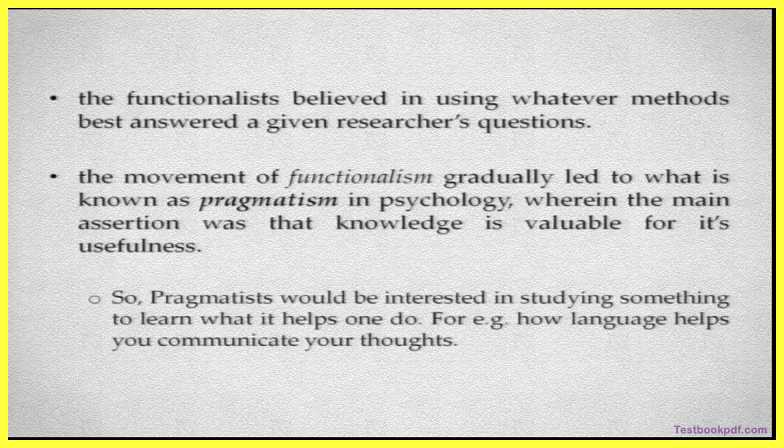
The functionalist believed in using whatever methods would have answered a particular researcher’s questions. They are not really too much about the methods but more about the kind of questions that are being asked. Now, this movement or this stance for functionalism gradually leads to what is known as pragmatism. Now pragmatism is also one of the popular approaches in psychology which basically is concerned with the fact that knowledge is valuable only for what is useful. You might know certain things you might have certain skills, but what are you using there before. That is basically what the functionalist wanted to say. So pragmatist wanted to say.
The pragmatist therefore would be interested in studying phenomena in a way that how this phenomenon will help you do attain certain things.
for example, if you ask a pragmatist to study language pragmatists would want to study language to actually understand how language helps you communicate your thoughts. So they would really want to study language, but only to the extent that it tells you or that it helps you accomplish particular kinds of behaviour.
Associationism
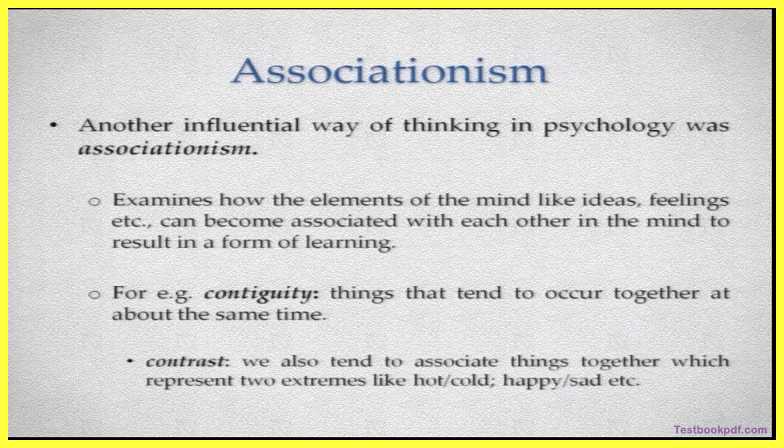
From structuralism and functionalism gradually they have developed another school of psychology or another school of thought in psychology is associationism. Another influential way of thinking in psychology was associationism basically examines how the elements of the mind like ideas, feelings, etc., can become associated with one another.
One of the ways say for example how the thing get associated with each other is contiguity or happening close in time.
for example, some of you might while you are going somewhere there is a cat that crosses your path. Maybe just after the cat crosses your path you meet by accident. Now just because these two events happen close in time together, you might want to or some of us might want to really link these two events.
So, this is one of the ways people generally link two events that happen close in time together. Another way could be by virtue of contra. So there could be feelings or ideas that could be the exact opposite of each other.
for example, feeling very elated or feeling very depressed or feeling happy or feeling sad, or say for example things like the experience of hotness or experience of coldness. So this is also one of the ways we actually link two ideas or two experiences together.
Hermann Ebbinghaus (1850 – 1909)
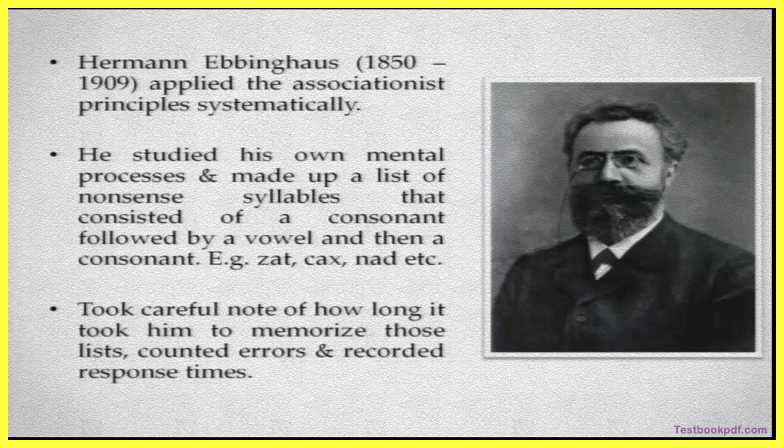
Hermann Ebbinghaus was the earlier psychologist who basically use this associationism more systematically. He studied his own mental processes and made up a list of nonsense syllables that consisted of a consonant or a vowel and then a consonant. He basically constructed a list of words like these – zat, cax, nad, etc., which basically he try to later memorize. He was basically he was very careful, he took careful note of how long it took him to memorize each of this list, and how many errors he would make and he recorded the response times as well.
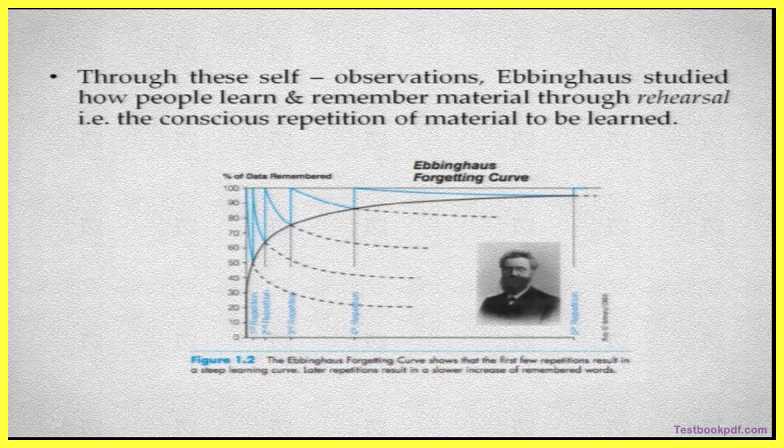
Through these self-observations, Ebbinghaus studied how people learn to remember material through processes like rehearsal which is basically the conscious repetition of material something which we most commonly do. Through his experience, Ebbinghaus actually finds out that it is the first few repetitions of the first early form of rehearsal that actually leads to most learning by later times at rehearsal basically do not give us that kind of output.
Edward L. Thorndike (1874 – 1949)
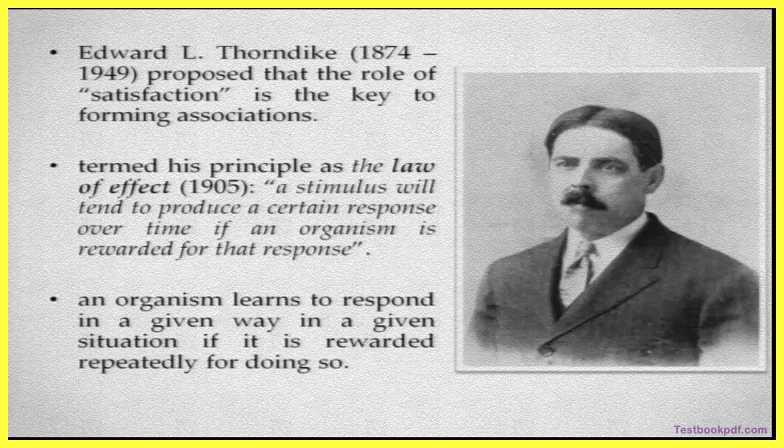
Edward L. Thorndike was another psychologist who was basically working with these principles of associationism. He basically was interested in investigating the rule of satisfaction; he says that he basically gives out of principle called the principle of the law of effect which says that a stimulus will tend to produce a certain response over time if an organism is rewarded for that response. So an organism basically learns to respond to a particular stimulus in a given situation if it is rewarded to behave.
for example, if there is a kid and you want to teach the kid something or say for example if there is an animal or a pet and you want to teach that animal something, you might want to teach that animal to stand up on his two hanging legs. Now you will have to reward the animal repeatedly over time to actually make him learn that kind of behaviour. Now we will wrap up over here and we will in the next Article talk about other aspects in the history of psychology that finally let to the shaping of what cognitive psychology is?
Read also:
All Psychological Perspectives Theory, Examples, Images, Pdf
Introduction to Cognitive Psychology Theory, Example, Images
Click here for Complete Psychology Teaching Study Material in Hindi – Lets Learn Squad
